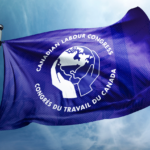How a 99-day strike in 1945 changed labour relations in Canada
The 1945 strike by 11,000 workers at a Ford plant in Windsor, Ontario was a turning point in Canadian labour relations. The 99-day labour dispute spread to include another 25 plants as workers walked off the job in solidarity with Ford workers. It resulted in a 3-day, worker-lead blockade of the Ford plant to stop police from moving in to break the strike – which forced the federal government to take action. It ended the strike and appointed Justice Ivan Rand to arbitrate a settlement that set the standard for union security and union representation that remains to this day.
In 1945, workers at the Windsor Ford plant went on strike; in doing so they helped bring union security to Canada’s workplaces. Their union, United Autoworkers Local 200, wanted all employees at the plant to be union members – something known as a closed shop – with union dues automatically deducted by Ford on each pay day. Ford refused, even though it had agreed to a similar arrangement with its American workers.
The issue of “union security” quickly became the issue in the labour dispute, because the union knew that it needed the financial security of an automatic dues checkoff system to effectively represent its members. Without it, the union steward was required to approach each worker to seek payment of union dues, and then hand out pins for them to wear to show they were members in good standing.
Negotiations stalled and, on September 12, the 11,000 workers at Ford’s Windsor plant went on strike. And the workers dug in. The thousands of soldiers who were returning to Canada and re-entering the workforce wanted a better world after sacrificing so much. They weren’t going to give up easily.
The strike closed the company’s powerhouse and shut off the heating system for the plant. As winter approached, the company grew desperate. It convinced the city and the province to mobilize hundreds of police officers to help break up the strike. In response, on November 5, 8,000 union workers from 25 plants walked off the job in solidarity with the Ford workers (and stayed out for a month without strike pay to support their families).
The next day, workers showed up with their cars and trucks and formed a blockade that stopped all traffic within 20 blocks of the Ford plant. It lasted for three days, effectively preventing a confrontation with the police force. The union’s show of strength forced the federal government to step forward with a proposal to end the strike by binding arbitration on the union membership and dues checkoff issues.
The arbitrator, Mr. Justice Ivan Rand, came up with a compromise. He provided for the dues checkoff, but not for the closed shop. All workers who benefited from the collective agreement had to pay dues to support it, but were not required to join the union. In return, the union would support all workers in enforcing the collective agreement and its benefits.
This uniquely Canadian compromise known as the “Rand Formula” eventually spread across the country, bringing with it union security and establishing the legitimacy of unions in workplaces from coast, to coast, to coast.
Since its enactment in 1946, the Rand Formula’s has come under attack many times, including a challenge based on the “freedom of expression” and “freedom of association” guarantees in the Charter of Rights and Freedoms that went all the way to the Supreme Court (which unanimously ruled against the challenge).






